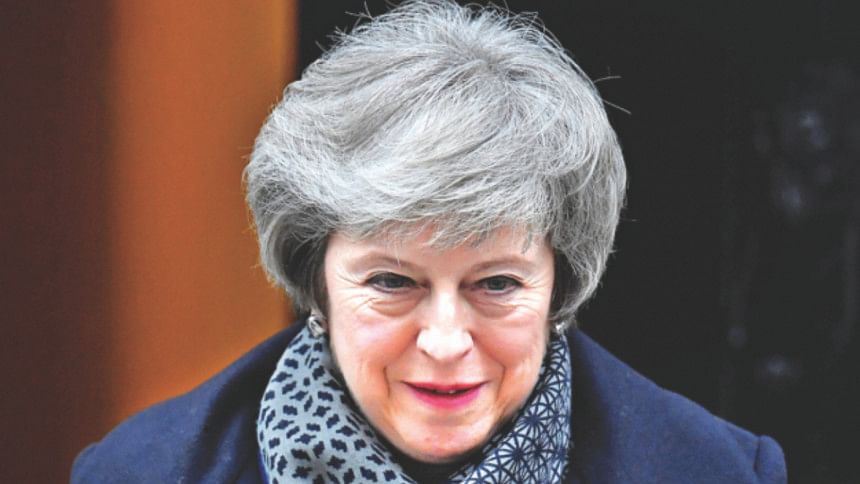UK PM's probable next Brexit steps

If May loses trust voteUnder the 2011 Fixed-Term Parliaments Act, losing a confidence motion begins a two-week process that could end in fresh elections. If the vote is lost, the government has 14 days to regain the confidence of parliament's lower House of Commons -- majority support -- confirmed by the passing of a motion to that effect. If it cannot, then theoretically, Corbyn himself could seek to build a coalition with other opposition parties to take office. In the event that no alternative government can be formed from the current composition of the house, parliament is automatically dissolved and elections called. |
WHAT IS MAY PROPOSING?
Immediately after Tuesday's 432 to 202 defeat was announced, May stood up in parliament and said: "I will then hold meetings with my colleagues, our confidence and supply partner the Democratic Unionist Party, and senior parliamentarians from across the House to identify what would be required to secure the backing of the House. The government will approach those meetings in a constructive spirit, but given the urgent need to make progress we must focus on ideas that are genuinely negotiable and have sufficient support in this House." May and her spokesman have refused to say if this means engaging directly with Corbyn.
WHAT IS UP FOR DISCUSSION IN THE TALKS?
May has already set out the terms on which she is willing to talk. She refers to them as principles for the discussion, opponents call them "red lines". She has committed to:
1) Deliver a clear, smooth and orderly Brexit. This demonstrates May's preference for leaving the EU with a deal, despite some in her party wanting to leave without a deal. But it does not rule out leaving without a deal, despite a majority in parliament having expressed their view that this option should be taken off the table. May has stressed that she does not want to delay Brexit, although she has not explicitly ruled that possibility out since Tuesday's vote. On Wednesday, she said the EU would only entertain any delay if there were a clear new plan. She has committed to make a statement on her new approach by Jan 21 at the latest.
2) Protecting United Kingdom's unity. This ambition is largely uncontroversial in parliament but there is huge disagreement on the means of achieving it. May has agreed to an insurance policy designed to prevent a hard border between EU-member Ireland and the British province of Northern Ireland. This approach has cost her the support of the Northern Irish party that props up her minority government and a large cohort of eurosceptic lawmakers in her own party. Scottish lawmakers have also complained their interests have not been given enough prominence by the government.
3) Giving Britain control of its borders, laws, and money. This refers to May's ambition to end free movement of people with the EU, end the jurisdiction of the European Court of Justice and stop making membership payments to the EU. This is important because ending free movement of people would appear to rule out forms of Brexit preferred by some lawmakers modelled on either membership of the single market or a deal similar to Norway's relationship with the EU.
4) Allowing Britain to have an independent trade policy. This principle is crucial because it appears to rule out Britain remaining a member of the EU customs union or, as the Labour Party leadership are demanding, a new permanent customs union with the EU.
CAN SHE SUCCEED?
May has largely kept to the negotiating principles she has used throughout the Brexit talks, which have alienated different groups of lawmakers on different points. There is no single policy change she can make which both respects those principles and brings in enough lawmakers to win parliamentary approval.
WHAT HAS THE REACTION BEEN?
May has been criticised by opposing lawmakers for engaging with them too late in the process, a reluctance to engage with the Labour Party leadership, and for not changing the principles, or red lines, she is willing to negotiate with.
Parliament's Brexit committee has called on May to hold a series of votes on different Brexit options to see which, if any has the support of a majority in parliament.
Vince Cable, leader of the Liberal Democrats who have 11 seats in parliament, said: "She shouldn't even bother lifting the telephone to opposition parties unless she is willing to rule out categorically a no-deal Brexit and unless she is willing to enter into a constructive conversation about a people's vote."
The leader of the Scottish National Party's 35 lawmakers in parliament, Ian Blackford, said: "The EU will not renegotiate. The Prime Minister has no answer. She has failed."
Arlene Foster, leader of the DUP which has 10 seats in parliament and supports May's government but not her Brexit deal said: "Reassurances, whether in the form of letters or warm words, will not be enough. The Prime Minister must now go back to the European Union and seek fundamental change to the Withdrawal Agreement. We will work with the government constructively to achieve a better deal. That is our focus."
Source: Afp,Reuters

 For all latest news, follow The Daily Star's Google News channel.
For all latest news, follow The Daily Star's Google News channel. 



Comments